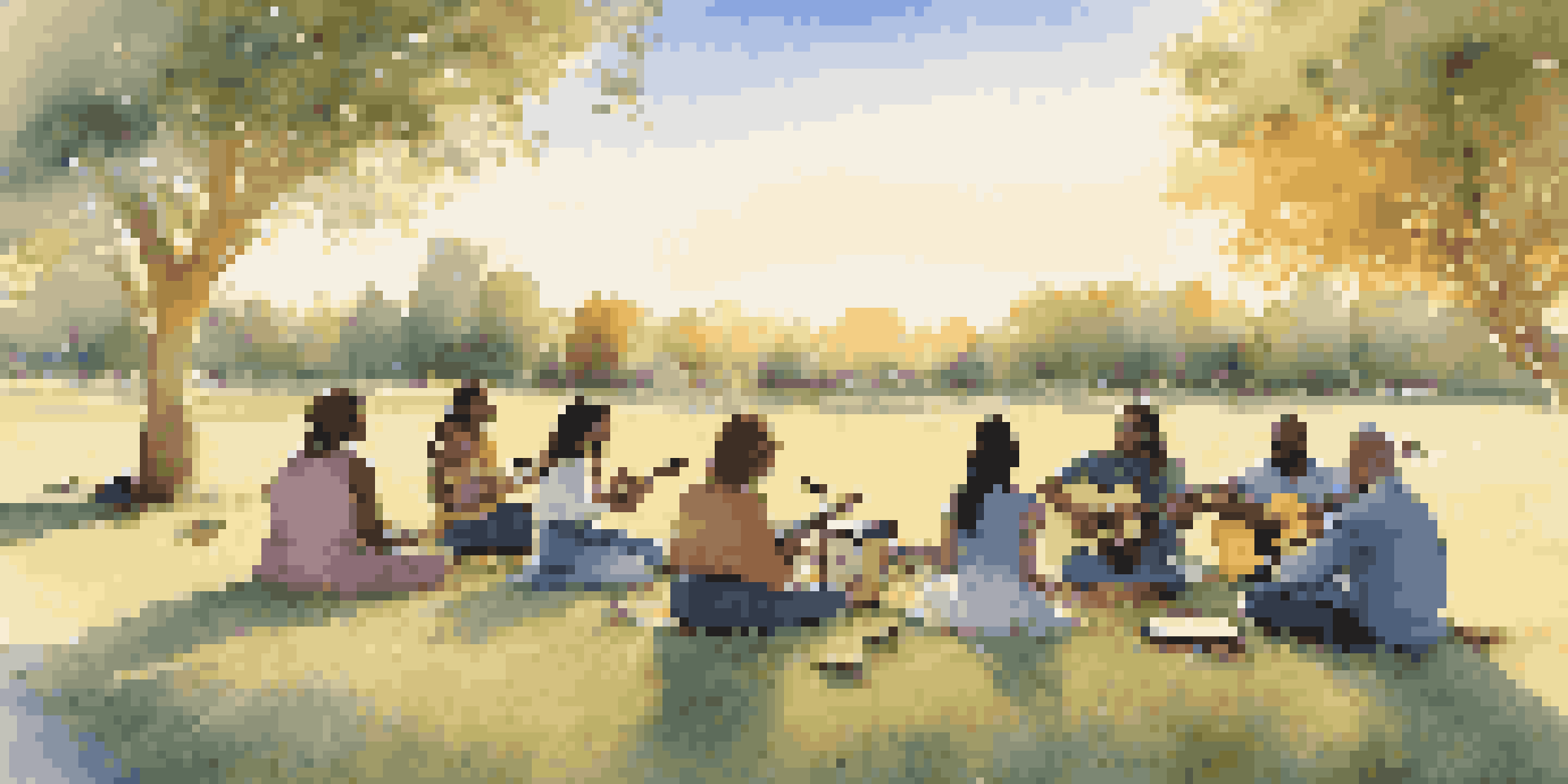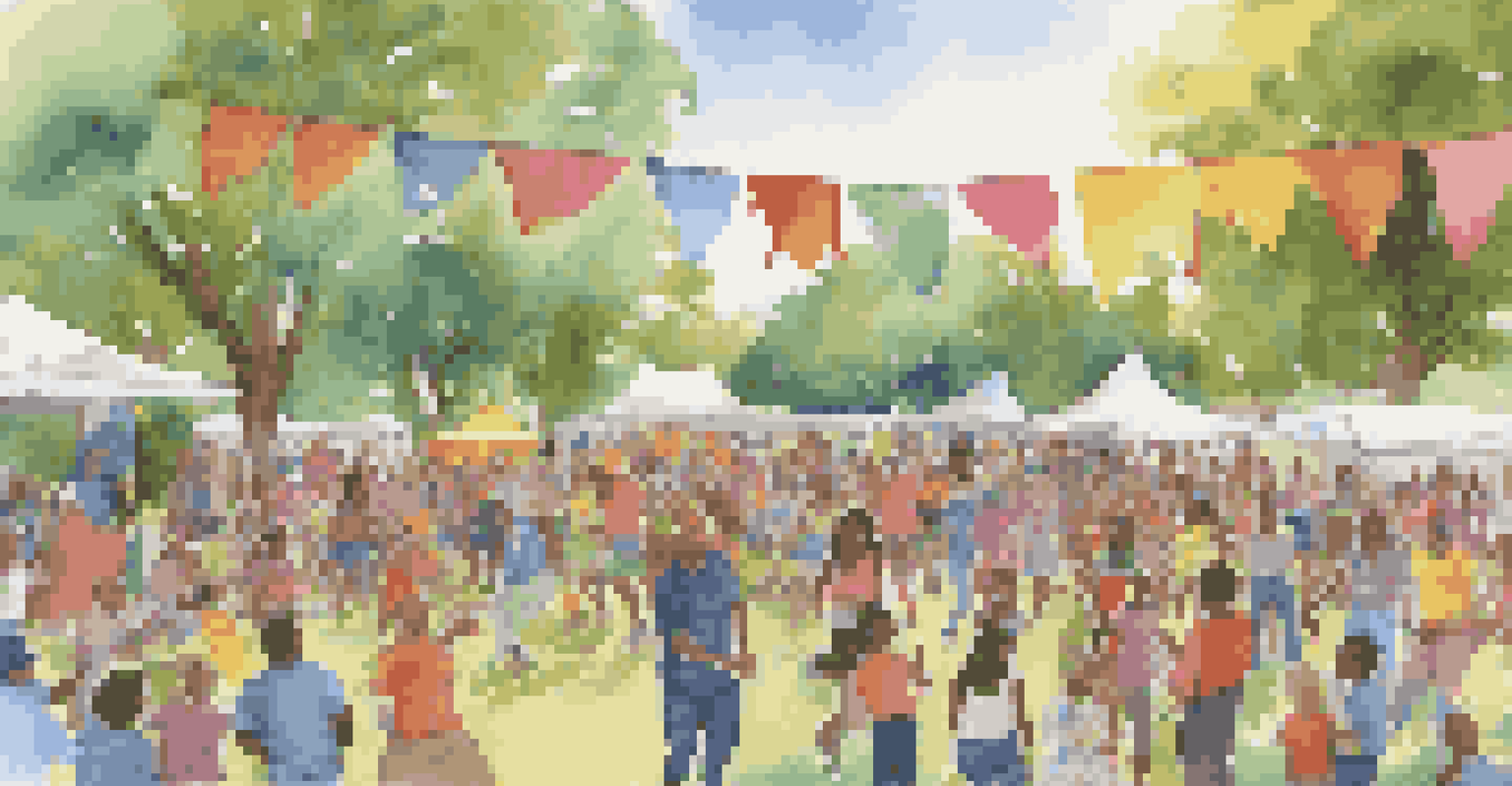The Beat of Recovery: Music's Role in Community Rehabilitation

Understanding the Healing Power of Music
Music has long been recognized for its therapeutic qualities, often bringing people together in times of need. Its ability to evoke emotions helps individuals process their experiences and feelings during recovery. Whether it’s the soothing sounds of classical music or the energizing beats of pop, music resonates with us on a personal level, making it a unique tool for healing.
Music can change the world because it can change people.
Research shows that music can reduce anxiety and depression, thereby enhancing overall well-being. For those in rehabilitation, music can serve as a source of comfort, encouraging them to confront their struggles in a safe space. Through lyrics and melodies, individuals can find solace and understanding, which is often crucial in their journey to recovery.
Moreover, music fosters a sense of community, as people connect over shared tastes and experiences. This collective engagement not only boosts morale but also reinforces social bonds, which are vital for emotional healing. By participating in music-related activities, individuals can feel less isolated and more supported in their recovery process.
Music Therapy: A Structured Approach to Healing
Music therapy is a formal practice that harnesses the power of music for therapeutic purposes. Trained music therapists use specific techniques to address a variety of emotional, cognitive, and social needs. This structured approach allows individuals to explore their feelings through songwriting, instrument play, or even listening to music, all under professional guidance.

One compelling aspect of music therapy is its adaptability; it can be tailored to suit different age groups and conditions. Whether working with children facing trauma or adults dealing with addiction, therapists create personalized sessions that resonate with their clients. This customization is key to making therapy effective and engaging for everyone involved.
Music Enhances Emotional Healing
Music serves as a therapeutic tool that helps individuals process emotions and fosters community connection during recovery.
Additionally, the therapeutic environment fosters trust and openness, encouraging participants to express themselves freely. By integrating music into rehabilitation programs, professionals can help individuals unlock their creativity and build resilience. This not only aids in recovery but also promotes a sense of empowerment as individuals rediscover their voices.
Community Music Programs: Building Connection
Community music programs provide a platform for individuals to come together and share their musical talents. These initiatives often encourage collaboration, allowing people to form bonds while creating something meaningful. Through group singing, drumming circles, or even open mic nights, participants can experience the joy of music as a collective form of expression.
Where words fail, music speaks.
Such programs are particularly beneficial in rehabilitation settings, as they foster a sense of belonging and acceptance. Participants often find that they are not alone in their struggles, which can be incredibly validating. This communal support helps to break down barriers and stigmas, creating a more inclusive atmosphere for everyone involved.
Moreover, community music programs can serve as a bridge to additional resources and support networks. They often lead to partnerships with local organizations, providing participants with access to counseling, workshops, and other rehabilitation services. By connecting individuals with a wider community, these programs enhance the overall recovery experience.
The Impact of Live Music on Emotional Well-Being
Live music events can serve as powerful catalysts for emotional healing and community engagement. The shared experience of attending a concert or performance can evoke feelings of joy and connection, reminding participants that they are part of something greater. These moments of collective enjoyment can be especially uplifting for those on a recovery journey.
Additionally, live music allows individuals to immerse themselves in the present moment, often providing a much-needed break from their everyday challenges. The energy of a live performance can lift spirits and inspire hope, encouraging attendees to envision a brighter future. This shared experience can spark conversations and friendships, further enriching the recovery process.
Accessibility in Music Therapy
Innovative approaches are being developed to ensure that music therapy is accessible to individuals with varying needs and circumstances.
Furthermore, many organizations are now hosting music festivals and events specifically focused on rehabilitation and recovery. These events not only raise awareness but also provide a platform for individuals to share their stories and celebrate their progress. Ultimately, the impact of live music can resonate well beyond the event itself, fostering long-lasting connections and support.
Overcoming Barriers: Accessibility in Music Programs
While the benefits of music in rehabilitation are clear, accessibility remains a significant barrier for many individuals. Some may have physical limitations that prevent them from participating fully in music-related activities, while others may not have access to resources or venues. Addressing these challenges is essential for ensuring that everyone can benefit from the healing power of music.
Innovative solutions are emerging to make music more accessible, such as adaptive instruments and virtual music programs. These initiatives allow individuals with disabilities to engage with music in ways that suit their unique needs. By embracing technology and inclusivity, more people can experience the joy and therapeutic effects of music, regardless of their circumstances.
Additionally, community organizations are increasingly focused on outreach efforts to connect with underserved populations. By bringing music programs to schools, rehabilitation centers, and community centers, they can reach individuals who may not otherwise have the opportunity to participate. Making music accessible to all is a vital step toward fostering a more inclusive and supportive environment for recovery.
The Role of Personal Expression in Recovery through Music
Personal expression is a powerful component of the healing process, and music offers an ideal outlet for it. Through songwriting, individuals can articulate their thoughts and emotions, transforming their experiences into something tangible. This creative process can be incredibly cathartic, helping individuals make sense of their journeys and find clarity amidst chaos.
Moreover, sharing personal music creations with others can foster vulnerability and intimacy, further strengthening connections within the community. When individuals witness the courage it takes to share personal stories, it often inspires them to open up as well. This exchange of experiences can create a profound sense of solidarity and understanding among participants.
Personal Expression Fuels Recovery
Through personal expression in music, individuals can articulate their experiences, fostering community bonds and boosting self-esteem.
As individuals explore their identities through music, they may also discover new passions and talents. Engaging in creative activities can boost self-esteem and encourage a sense of agency, empowering individuals in their recovery. Ultimately, personal expression through music can be a transformative experience, helping individuals reclaim their narratives and rebuild their lives.
Looking to the Future: Music and Community Rehabilitation
As we continue to understand the profound impact of music on recovery, it's clear that its role will only grow in importance. With ongoing research and innovation, music therapy and community music programs are likely to become more integrated into rehabilitation practices. This evolution will help ensure that individuals have access to a holistic approach to healing, where music is a central component.
Additionally, as communities prioritize mental health and well-being, the demand for music-based programs will increase. This shift can lead to more funding and support for initiatives that use music as a tool for recovery. By investing in these programs, communities can cultivate a culture of healing and resilience that benefits everyone.

Ultimately, the beat of recovery is a collective rhythm, one that resonates through shared experiences and connections. By embracing music as a vital part of rehabilitation, we can empower individuals to navigate their journeys with hope and strength. Together, we can create a future where music plays an essential role in healing and community building.